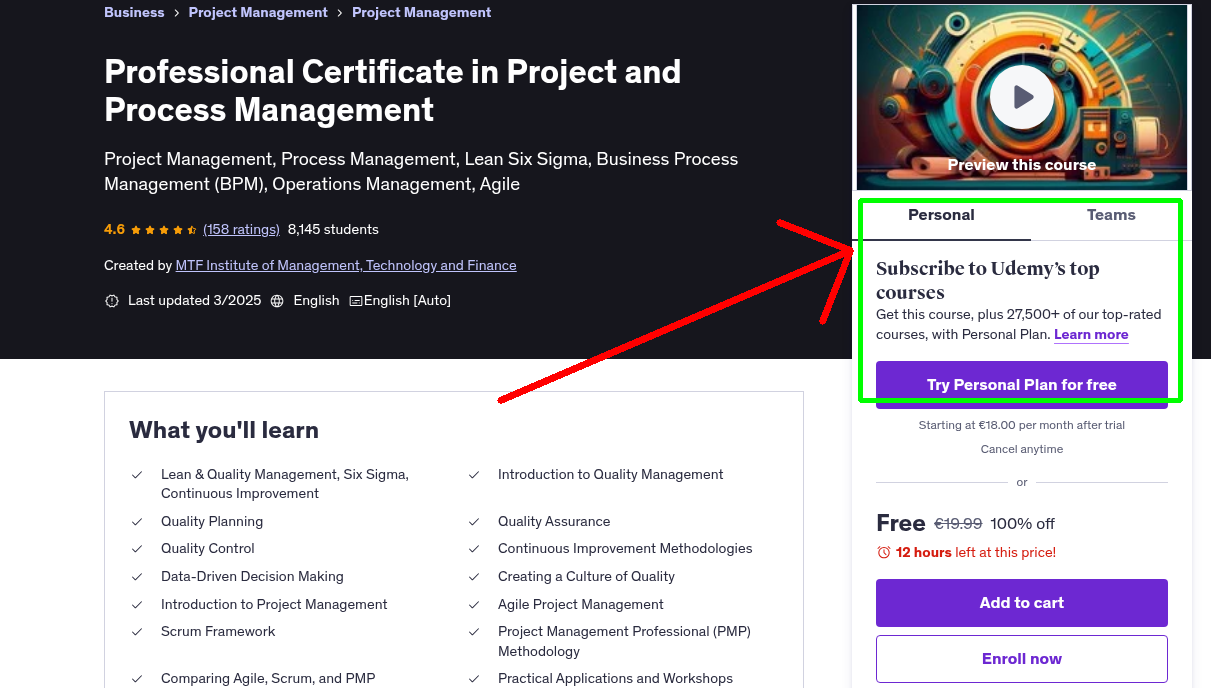
What You'll Learn
- Lean & Quality Management, Six Sigma, Continuous Improvement
- Introduction to Quality Management
- Quality Planning
- Quality Assurance
- Quality Control
- Continuous Improvement Methodologies
- Data-Driven Decision Making
- Creating a Culture of Quality
- Introduction to Project Management
- Agile Project Management
- Scrum Framework
- Project Management Professional (PMP) Methodology
- Comparing Agile, Scrum, and PMP
- Practical Applications and Workshops
Requirements
- For a better learning experience, we suggest you to use a laptop / mobile phone / pen and paper for taking notes, highlighting important points, and making summaries to reinforce your learning.
Who This Course is For
- No special requirements. A course for anyone who wants to build career in Project Management, Lean & Quality Management, Six Sigma, Continuous Improvement
- Agile is a flexible, iterative approach to project management that emphasizes collaboration, customer feedback, and the ability to adapt to change. It is a set of principles and values that guide how teams work together to deliver projects. Agile is often used in software development, but it can be applied to any type of project.
- Scrum is a specific Agile framework that provides a set of rules and practices for managing projects. It is based on the idea of short, iterative cycles called sprints. Scrum teams are typically small, cross-functional, and self-organizing.
- PMP stands for Project Management Professional. It is a globally recognized certification that demonstrates a person's knowledge and skills in project management.
- Why Implementing Project Management Methodologies Is Important for Companies Improved project planning and execution Increased efficiency and productivity Reduced costs and risks Improved communication and collaboration Increased customer satisfaction Better ability to adapt to change
- Why Developing Project Management Skills Is Important for Your Career Increased earning potential Improved job prospects Greater career advancement opportunities Enhanced professional credibility Increased ability to contribute to organizational success Improved leadership and teamwork skills
- In addition to the above, here are some other reasons why developing project management skills is important for your career: Project management skills are in high demand. Project management skills are transferable across industries. Project management skills can help you to be more successful in your current role. Project management skills can help you to start your own business.
- Lean Management What it is: A management philosophy focused on maximizing customer value while minimizing waste. It emphasizes streamlining processes, eliminating non-value-added activities, and continuous improvement. Key Principles: Identify and eliminate waste (overproduction, waiting, transportation, defects, etc.) Optimize processes for flow and efficiency Empower employees to identify and solve problems Create a culture of continuous improvement
- Quality Management What it is: A systematic approach to ensuring that products or services consistently meet or exceed customer expectations. It involves setting quality standards, measuring performance, and taking corrective action to improve quality. Key Principles: Customer focus Continuous improvement Process-centered approach Data-driven decision making Employee involvement
- Six Sigma What it is: A data-driven methodology focused on reducing defects and variation in processes. It aims to achieve near-perfect quality by identifying and eliminating the root causes of defects. Key Principles: Define the problem and customer requirements Measure the current process performance Analyze the data to identify root causes of defects Improve the process by implementing solutions Control the improved process to ensure sustained performance
- Continuous Improvement What it is: An ongoing effort to improve products, services, or processes. It involves constantly seeking ways to do things better, faster, and more efficiently. Key Principles: Small, incremental changes Focus on customer needs Employee involvement Data-driven decision making
- Importance for Companies Developing these skills is crucial for companies because they lead to: Increased efficiency and productivity: By eliminating waste and streamlining processes, companies can produce more output with fewer resources. Improved quality: By focusing on quality management and defect reduction, companies can deliver better products and services that meet customer expectations. Reduced costs: By improving efficiency and quality, companies can reduce waste, rework, and customer complaints, leading to lower costs. Increased customer satisfaction: By delivering high-quality products and services that meet customer needs, companies can increase customer satisfaction and loyalty. Enhanced competitiveness: By continuously improving their processes and products, companies can stay ahead of the competition and thrive in the market.
- Importance for Careers of Managers and Experts Developing these skills is also essential for the careers of managers and experts because they: Increase employability: Companies are always looking for individuals with expertise in lean management, quality management, Six Sigma, and continuous improvement. Enhance problem-solving skills: These methodologies provide a structured approach to problem-solving, enabling managers and experts to identify and address issues effectively. Improve leadership abilities: By leading continuous improvement initiatives, managers and experts can develop their leadership skills and demonstrate their ability to drive positive change. Boost career advancement opportunities: These skills are highly valued by employers and can lead to promotions and other career advancement opportunities.
- Developing skills in lean management, quality management, Six Sigma, and continuous improvement is crucial for both companies and the careers of managers and experts. These methodologies provide a powerful toolkit for improving efficiency, quality, and customer satisfaction, leading to increased competitiveness and career success.
Your Instructor
MTF Institute of Management, Technology and Finance
Institute of Management, Technology and Finance
4.4 Instructor Rating
101,718 Reviews
970,300 Students
274 Courses
Never Miss a Coupon!
Subscribe to our newsletter to get daily updates on the latest free courses.



